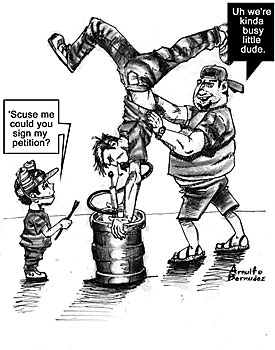
Illustration by Arnulfo Bermudez
|
By Jessica Lee
Arizona Summer Wildcat
Wednesday August 6, 2003
Closing time / one last call for alcohol / so finish your whiskey or beer. / Closing time / you don't have to go home, / but you can't stay here," sings the group Semisonic in their popular song, "Closing Time."
For many UA students, when the lights flash or the bell rings, it means the night is over. For others, it is time to cruise over to after-hour parties and continue drinking alcohol that was purchased before the magical time.
But what if the last call in Arizona was not at 1 a.m.?
Arizona United is a group of Arizona citizens who have organized to push the sale of alcohol back to three in the morning. The organization filed a citizen's ballot initiative with the state in May in an attempt to put the drinking curfew into the hands of voters in November 2004. The group has less than 11 months to gather 122,612 signatures in order to put the initiative, nicknamed the "Last Call Act of 2004," on the ballot.
That is, 122,612 John Hancocks of actual registered voters.
Very few Arizonans are aware that such an initiative is seriously being pursued. Jim Lugo, chairman of Arizona United, has an enormous task ahead of him. "Starting this fall semester, we are going to visit all college and high school campuses across the state to educate people why the initiative is a good idea," Lugo said over the phone. Although the group originated in the Phoenix metropolitan area, they hope to soon have bases set up on all the university campuses. The UA does not currently have a representative for this 3 a.m. crusade.
In an ironic twist, the group's main tactic is to target 18-to-30-year-olds in order to get the initiative on the ballot quickly. Since they need all the signatures they can get, they feel that approaching underage adults is not a philosophical no-no. "Age changes; they won't stay 18 or 19 forever," Lugo noted. "I don't see any moral dilemma. It will affect all Arizonans."
Although the initiative has not yet met organized opposition, it is easy to foresee Mothers Against Drunk Driving (MADD) and collective neighborhood organizations fighting to keep it off the ballot. While MADD would like to eliminate the possibility of drunk drivers by regulating alcohol consumption, Lugo points to statistics on their website that demonstrate that states with longer drinking hours have fewer alcohol-related fatalities.
Would fewer people binge drink if they could take their time getting intoxicated? And would tipsy people voluntarily stop drinking around 2 a.m. so they could sober up enough to drive by 3 a.m.?
Arizona United also points out that by keeping the bars and clubs open longer, there will be fewer neighborhood parties.
While most people of legal drinking age would probably prefer to stay later at beer-guzzling establishments, it is not necessarily true that the number of house parties would decrease. The poor 18-to-20-year-olds who voted for the initiative would still be stuck at home, and when the bars did shut down at 3 a.m., house parties would flare up once more.
Interestingly, some neighborhood associations are not as worried about house parties as they are about the incidental noise from those who live nearby coming home at late hours. If the initiative passed, "it would have a huge impact in neighborhoods," claimed Melody Peters, spokeswoman for the Rincon Heights Neighborhood Association. "People party and still go home. Our homes are close together. People come home, gun up car motors, talk loudly and slam doors, and there is nothing we can do about it; it is much worse. If there is a house party, we can call the police."
Neighborhoods full of college students would expect loud noise at later hours, but perhaps that is part of the living-near-the-university package. According to the website www.lastcallact.com, Arizona is one of the few states to have a 1 a.m. drinking curfew. Of the nation's 50 largest cities, only four force businesses to stop selling at one hour past midnight. Three of those four cities ÷ Phoenix, Tucson and Mesa ÷ are in Arizona.
It makes one wonder if extending the hours would be so bad after all.
"I see no harm in it. Lots of other states have drinking late into the night. It would help the economy because more people would be out spending money," said Nate Hutter. Hutter, a junior studying secondary education with a focus on religion at Pima Community College, would "most definitely" stay out later if the initiative passed.
Brooke Althaus, a 2003 fine arts graduate, added that the new law would benefit those who have night jobs. "(The current law) limits the ability to go out because when they get off work, the bars are closed."
On whether changing the state drinking law would affect campus greek life, Clint Walls says probably not. As vice president of public relations for the Interfraternity Council, Walls suspects that the only thing that might change within the fraternity lifestyle is that house parties might be able to run until 3 a.m. However, that would require GAMMA ÷ Greeks Advocating the Mature Management of Alcohol, the group that sets standards for curbing alcohol abuse in the greek system ÷ policies to be changed.
Beth Conder, the coordinator for greek life programs, could not comment on the possibility of GAMMA regulations being changed because GAMMA student representatives would have to review the possibility and determine if drinking Ītill 3 a.m. would "be appropriate, necessary and beneficial" to UA greek organizations.
The beauty of the initiative is that it falls into the hands of the voting community. If Jim Lugo and his posse can manage to find enough registered voters who are sober enough to sign their names, the initiative deserves a chance.
If not, perhaps it is better we all get flushed out at 1 a.m.

